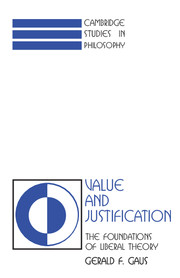VIII - THE STATE OF NATURE
Published online by Cambridge University Press: 05 June 2012
Summary
In the previous chapter, I examined the nature of moral justification and its relation to systems of value. Two main conclusions emerged. Firstly, the agent-relativity of value-based reasons to act points toward constrained teleological justifications – the mode of moral justification that characterizes contractualist argument. Properly understood, such justifications aim at demonstrating the existence of a common good that provides everyone with overriding reasons to act. Secondly, however, I argued that plausible teleological justifications presuppose deontological justifications. As we have seen, value systems presuppose moral beliefs; to try to justify these foundational moral beliefs teleologically, I maintained, either is circular or requires some objectionable specification as to what valuings count in moral justification.
In the next two chapters, I explore the implications of this analysis through a defense of a liberal understanding of public morality. The aims of these chapters are thus twofold. My overriding concern is to show that the theory of justification developed in the last two chapters is not so demanding that it precludes any justified morality. That is, I want to rebut the charge – heard, it seems, with increasing frequency – that modern ethics, relying on “subjectivist” theories of value, is essentially nihilistic. But, secondly, I wish to do this via the defense of an essentially liberal understanding of public morality. Hence, these chapters are explicitly normative.
- Type
- Chapter
- Information
- Value and JustificationThe Foundations of Liberal Theory, pp. 379 - 428Publisher: Cambridge University PressPrint publication year: 1990

